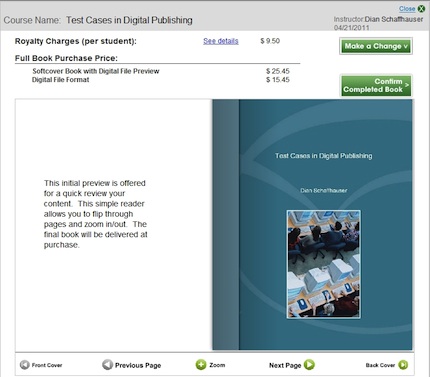AcademicPub Opens Custom Textbook-Building to Faculty
- By Dian Schaffhauser
- 04/26/11
A company with technology for creating digital-to-print books is getting into the textbook market. AcademicPub, a division of SharedBook, has introduced a service that enables instructors to create digital and print texts by compiling materials from multiple sources: copyrighted works, faculty-created material, and resources the company has in its own library. The service also enables the instructor to collect royalties on the materials he or she personally provides in the textbooks.
Permission to use copyrighted information from outside the library is provided by the Copyright Clearance Center. During creation of the textbook, the user specifies that he or she wants help in doing copyright clearance as well as royalty collection, both for small fees. If the college or university that will be using the textbook already subscribes to a copyright clearing service, the user can specify that to eliminate additional clearance-related expense..
The basic process for creating a new book is fairly simple: After logging into the site, the user specifies a title, compiles and adds material section by section, selects a basic cover, specifies photos for the covers, writes an introduction, reviews the book in low-resolution format, and then finalizes it for print in digital or hardcopy form. Before final publication, the author can go into the text and move sections around and delete and add material. A 54-page sampler that included an article from a mainstream publishing company along with an extensive PDF with no royalty fee attached was priced at $25.45 for a softcover book with a digital file preview and $15.45 for a digital file-only format.

A sample textbook from AcademicPub's service that incorporates copyrighted and non-copyrighted source material. |
AcademicPub offers a searchable library that includes content from multiple publishers, including EBSCO, Foreign Affairs, and the American Institute of Physics. The library has a recommendation feature to help the user home in on specific content in the library, which currently features 100,000 "units" of articles, textbook chapters, scholarly research, and cases.
If the user extracts Web material for inclusion in the book, the HTML is converted to a "print-ready" format. Sources can also include video and audio that will open in a new browser window when the reader clicks on links in the digital edition of the textbook.
AcademicPub's digital output is compatible with the iPad, Android devices, and the Sony Reader, among others.
As the book is compiled from various sources, the user can see the royalty charge tabulation (which also includes processing fees for "copyright clearance processing").
"Our goal with AcademicPub is to provide ease-of-use for educators across all disciplines and lower cost of materials for students across all types of post-secondary schools," said SharedBook CEO Caroline Vanderlip. "We aim to serve faculty members and students. Both are looking for alternatives in today's learning environment, where the digital revolution has made achieving teaching objectives with traditional textbooks more difficult, and where decreased state and endowment support for colleges has made higher education more costly. AcademicPub addresses these faculty and student challenges with an offering that is dynamic and dollar-wise."
About the Author
Dian Schaffhauser is a former senior contributing editor for 1105 Media's education publications THE Journal, Campus Technology and Spaces4Learning.